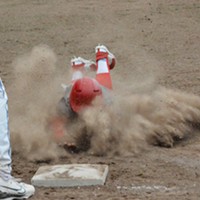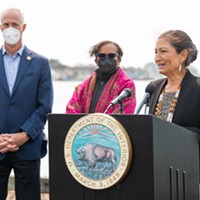There’s Nothing Clean About Offshore Wind Development Unless California Tribes are Involved
By Frankie Myers[
{
"name": "Top Stories Video Pair",
"insertPoint": "7",
"component": "17087298",
"parentWrapperClass": "fdn-ads-inline-content-block",
"requiredCountToDisplay": "1"
}
]
Since colonization began, the impacts of natural resource extraction have devastated Indigenous communities in the United States and across the globe.
In Northern California, gold miners inflicted nearly irreparable damage to the Klamath River, the lifeline of my people. Hydropower dams spurred the collapse of salmon runs that sustained us since the beginning of time. Industrial timber companies transformed our diverse oak woodlands into pine tree plantations that fuel extreme wildfires, robbing us of acorns and even our homes.
These shortsighted actions are also an assault on our sacred connection to the land, which is fundamental to who we are as Native people.
So when the offshore wind industry tells us about all the great opportunities their projects will provide Native people, we’ve heard it before.
The Yurok Tribe, the largest in California, will not let another industry commit violence against our people, our ancestral landscape or our cultural viewsheds. During sacred renewal ceremonies, we pray at the summit of high mountain peaks, which offer an unobstructed view of the ocean. These prayer seats represent the last places where we can see the world through the eyes of our ancestors. The ability to focus on our prayers without having to view the destruction wrought by industry is critical to our cultural identity.
The experience is a constant reminder of who we are and where we come from.
The U.S. Bureau of Ocean Energy Management recently selected two multinational corporations to develop large wind projects off our coast. While some bidders met with my tribe, California North Floating and RWE Renewables have not.
This lack of outreach has revived concerns that history is repeating itself. California tribes are worried that these corporations will come in, profit off of our resources and leave our communities poorer for it – as their predecessors did.
Offshore wind developers on the East Coast excluded Native American tribes from participating in project planning and development. To add insult to injury, a now-defunct project off the shores of Wampanoag territory in Massachusetts was ignorantly named the “Mayflower Project.”
For an industry that proclaims the importance of diversity, equity and inclusion, it is hard to fathom why Native American tribes were completely left out of the decision-making process and instead insulted with a name associated with the beginning of the Native American genocide.
Indigenous tribes have holistically managed marine, riverine and terrestrial ecosystems to maximize biodiversity and resilience since time immemorial. In return, the natural world provided everything we needed to survive.
Until recently, we were the sole decision-maker regarding the management of our environment. The choice to move forward with offshore wind projects should be the sole right of the tribes that have sacrificed so much while others amassed generational wealth from our resources.
Tribal nations may decide to support offshore wind development. If that happens, Native people must be in leadership positions through every phase of the process – from planning, construction and operation to potential decommission. Tribes need to have both an economic stake in the corporations as well as seats on the governing boards of those companies.
This will help ensure that these projects are prosperous and sustainable over the long term.
Wind energy developers have a chance to chart a new course not only for the energy sector but for how Native people are treated by multinational corporations. Tribal involvement should begin by acknowledging that Indigenous people are an integral part of the environment. What happens to our land, rivers and ocean affects our ability to exist.
Offshore wind presents an opportunity to develop the clean energy America needs. But unless offshore wind truly engages with the Native American tribes that suffered the impacts from previous natural resource extraction, it will be as dirty as the rest of them.
Speaking of...
-

New Plan Could Help Humboldt Foster Kids Afford Extracurriculars
Apr 2, 2024 -

Huffman, Haaland to Visit Humboldt Bay Amid Growing Tribal Offshore Wind Opposition
Mar 26, 2024 -

Final Election Night Report Leaves Races Unchanged: Incumbents Lead Supes Contests, Van Dyke Ahead for Judgeship
Mar 5, 2024 - More »
Comments
Showing 1-1 of 1
Latest in Views
Readers also liked…
-
Hope
- Sep 7, 2023
-
California Says No to Privatizing Medicare
- Sep 21, 2023































